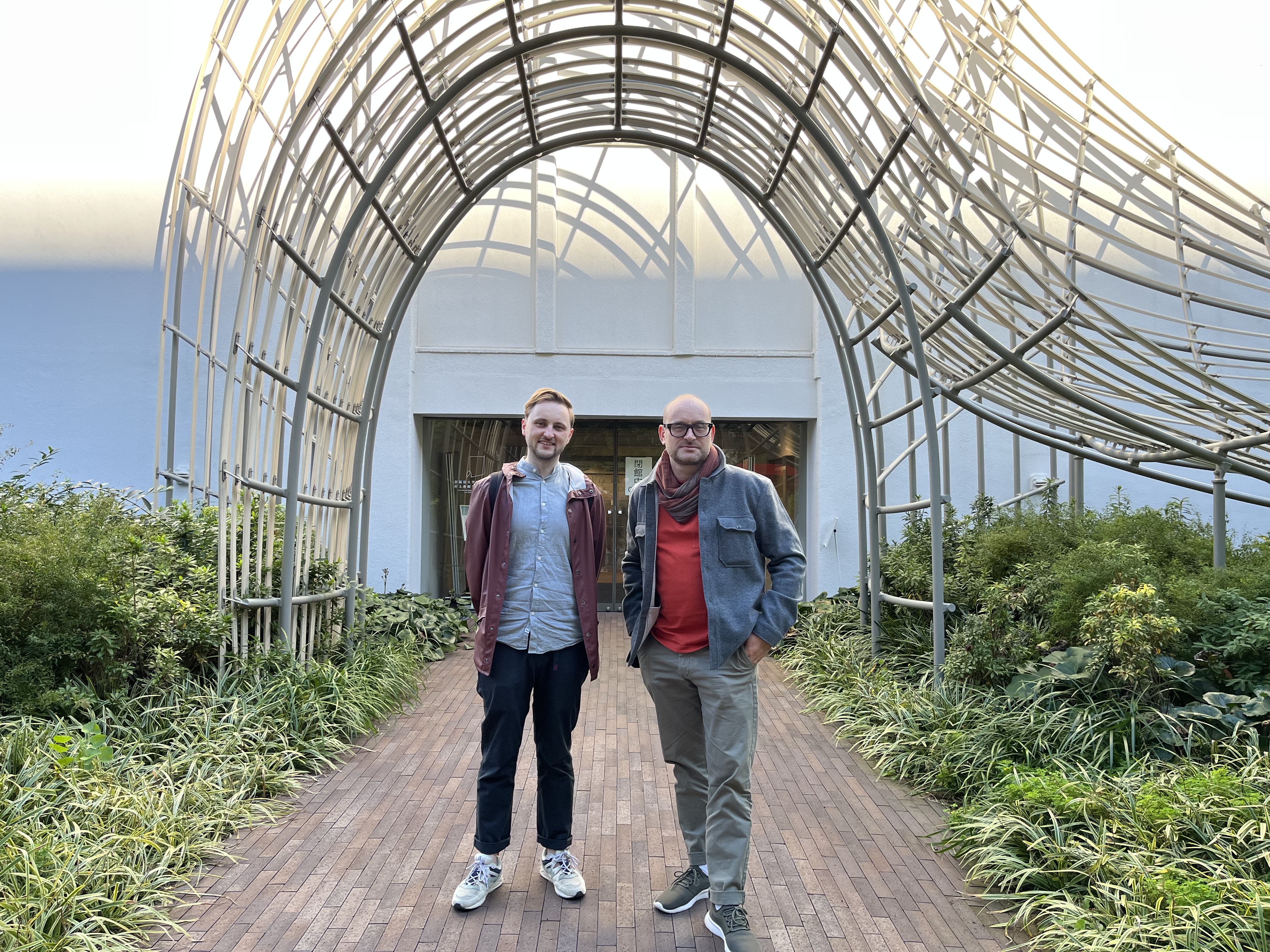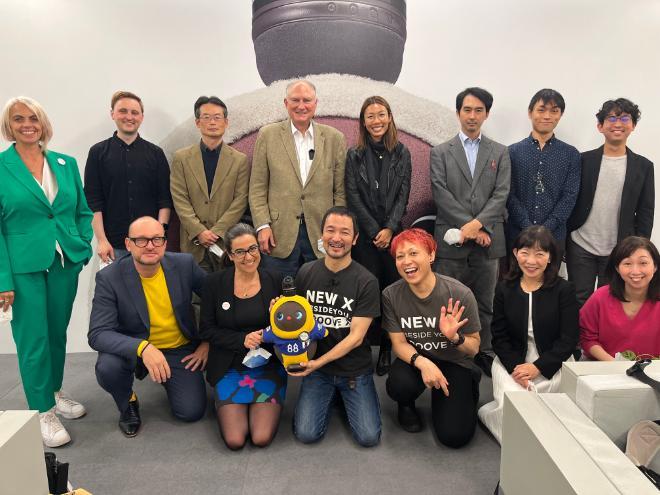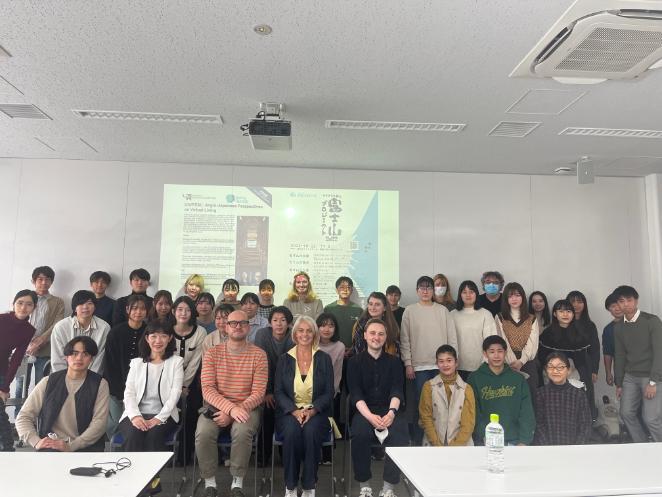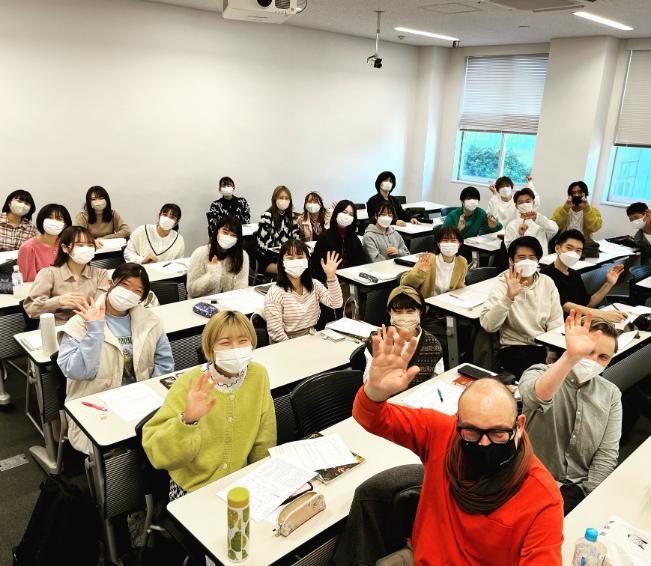Artificial friends in Japan

Max Berghege, PhD research student in the School of Humanities’ Centre for Transnational and Transcultural Research and Sebastian Groes, Professor in English Literature at the University blog about the connections between Japanese and British cultures in the digital age.
“No, not fun, just very different.” This is what the main character of the popular film Lost in Translation (2003), Bob Harris (played by Bill Murray), states about Japan when he’s in Tokyo shooting a commercial for Santori whiskey. When watching the movie today, one cannot help but feel that it is stereotyping and orientalising Japanese culture – even mocking the Japanese pronunciation of English, for instance. It’s a crass, offensive view of an intriguing, complex culture.
Max and I visited Japan for 10 days as part of the UN/REAL project funded by the Daiwa Foundation, looking for connections between Japanese and British cultures in the digital age. We want to understand how transcultural perspectives could create new perspectives on the benefits and problems that hybrid living renders. What can we learn from our experiences?
During the first few days, Japan felt different from the West. The obsession with hygiene is striking for instance: there’s a smoking ban in the streets, no rubbish bins in the pristine street to put away your waste and the high-tech toilets are just mind-boggling – they have a variety of ways to wash your bum and there’s a button for music that masks embarrassing toilet noises. People interact humbly and politely, and they communicate in a quiet and understated manner. To understand Japanese interactions, you have to make an effort to decipher the cultural codes that underpin them. Often it is more about how you say it, with an important role for body language, instead of what you are saying.
Despite its differences, we found more connections between the West and the East. Human beings have universal concerns: they love, cry, laugh, hope and yearn the same everywhere. And today technology seems key to reinforming those universal characteristics.
We had the pleasure of teaching about 50 students at Waseda University in Tokyo, where we discussed how Artificial Intelligence has very rapidly become part of everyday lives. The students were asked what their own robot would look like. How would it speak (neutral, with some emotions in its voice)? Would it have a gender (no, it would not be male or female)? We discussed the purpose of AI support systems: elderly people, for instance, could use help, but the students also noted that disabled people could benefit very well from robots.
At the University of Tokyo, we discussed Kazuo Ishiguro’s novel Klara and the Sun, a story about a sick girl who has an “Artificial Friend”, an android who mentally and emotionally supports her. Professor Alex Goody (Oxford Brookes University) gave a fascinating keynote on how Klara can be read as a comment on people with autism, and she invited us to consider including different, even non-human perspectives in our understanding of reality. Dr Jerrine Tan (City of Hong Kong University) pointed out that the novel predicts a future of growing social divisions, whereby digital inequality separates the 'haves' from the 'have-nots.'

In the evening, we moved to the LOVOT Museum in Tokyo, where we discussed to role of AI systems in supporting humans. At the “Artificial Friend in Japan” event for the Being Human Festival, the LOVOT’s designer, Kota Nezu, challenged us to imagine that perhaps artificial intelligence is not here to support humans, but that us humans should support robots. Professor Goody continued to talk with Wolverhampton PhD-student Max Berghege and Dr Jerrine Tan about the role of AI in our lives, considering amongst others how the world of tech still has many prejudices against women built into how it operates. This discussion will be continued next week Wednesday at the Artificial Friends event at the Wolverhampton Art Gallery, where writer Kate Pullinger, Dr David Devanny, and ChatBot designer David Burden will talk to me about the ethical ambiguities of AI.
Max and I took a train to Tsuru University, 90 minutes to the northwest of Tokyo, where we attended a performance by the Japanese writer Yoko Tawada as part of the Fujisan Literary Festival. The next day we held a workshop on Klara and the Sun, where 15 Tsuru students gave their perspectives on the novel. It was an illuminating event showing how literature still provides an important space to think about how the world is changing very rapidly. In the afternoon, we went on a cultural trip across the region, though the highlight, Mount Fuji, refused to reveal itself to us – covered in clouds. It was a disappointment.

On our final day, however, the sky was clear and we viewed the majestic mountain. But what we saw wasn’t exactly clear. The top of Fuji seemed to float in the air, surrounded by swirling clouds whilst its fragmented reflection shimmered in the water of the lake below us. The vista seemed a mirage – it was unreal. The real world presented itself to us as a mystery, a conundrum.
We got back on the train to Tokyo, puzzled by what we had experienced, within the back of our minds a quote by Yoshida Kenko, a Japanese writer, and monk, who once said: “The most precious thing in life is its uncertainty.”
To learn more, book your place at the Artificial Friends session, as part of the Being Human Festival, on November 16.
For more information please contact the Corporate Communications Team.


/prod01/wlvacuk/media/departments/digital-content-and-communications/images-2024/Diane-Spencer-(Teaser-image).jpg)
/prod01/wlvacuk/media/departments/digital-content-and-communications/images-18-19/220325-Engineers_teach_thumbail.jpg)
/prod01/wlvacuk/media/departments/digital-content-and-communications/images-2024/240509-Menopause-Research-Resized.jpg)
/prod01/wlvacuk/media/departments/digital-content-and-communications/images/Maria-Serria-(teaser-image).jpg)
/prod01/wlvacuk/media/departments/digital-content-and-communications/images-2024/241014-Cyber4ME-Project-Resized.jpg)
/prod01/wlvacuk/media/departments/digital-content-and-communications/images-2024/240315-Research-Resized.jpg)
/prod01/wlvacuk/media/departments/digital-content-and-communications/images-2024/BDA-group-photo.jpg)
